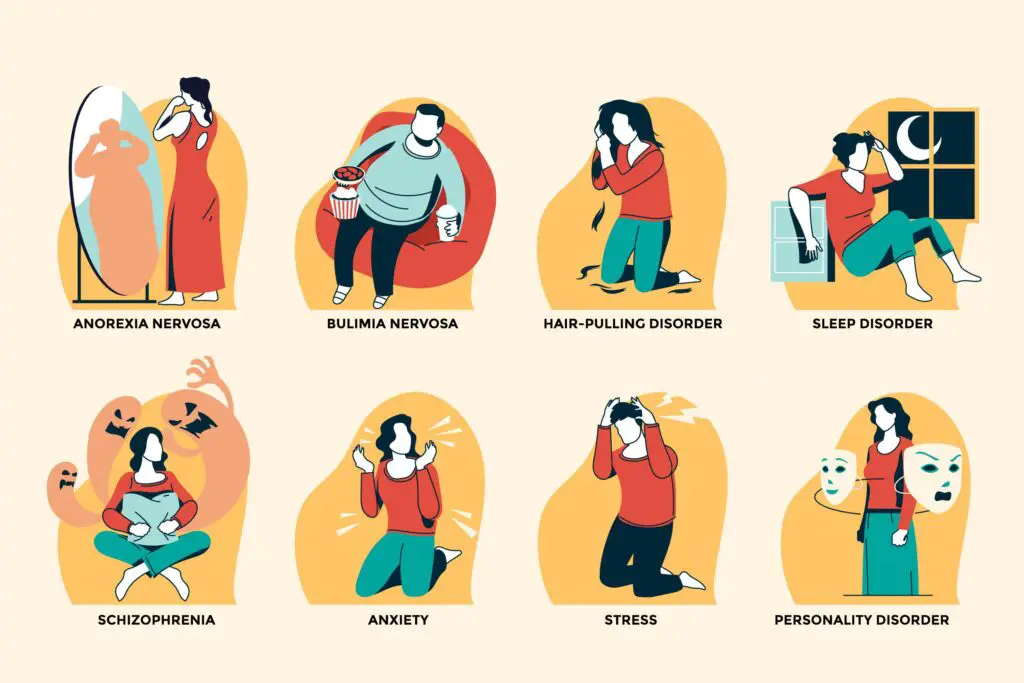In today’s fast-paced world, where the demands of daily life can be overwhelming, maintaining good psychological health is paramount. In this comprehensive article, we delve into the intricate aspects of psychological health, offering insights, tips, and strategies to help you lead a more mentally fulfilling life.
[Introduction to Psychological Health, Defining Psychological Health, Importance of Mental Well-being, A Holistic Approach, The Mind-Body Connection, Psychosomatic Interaction, Impact of Psychological Health on Physical Health, Techniques for Achieving Mind-Body Harmony, Understanding Mental Health Disorders, Common Mental Health Disorders, Anxiety Disorders, Mood Disorders, Psychotic Disorders, Less Common Disorders, Eating Disorders, Personality Disorders, Trauma and Stressor-Related Disorders, Factors Affecting Psychological Health, Biological Factors, Environmental Factors, Psychological Factors, Social and Cultural Factors, The Role of Genetics in Mental Health, Genetic Predisposition, Identifying Genetic Markers, Genetic Counselling, The Impact of Stress on Mental Well-being, Types of Stress, Coping Mechanisms, The Psychology of Resilience, Resilience Defined, Building Resilience, Resilience in the Face of Adversity, Psychological Health Across the Lifespan, Children and Adolescents, Adults, The Elderly, Age-Related Mental Health Concerns, The Significance of Emotional Intelligence, Defining Emotional Intelligence, Enhancing Emotional Intelligence, The Role of Emotional Intelligence in Psychological Health, The Stigma Surrounding Mental Health, Historical Perspective, Destigmatizing Mental Health, The Importance of Seeking Help, Psychotherapy and Counselling, Approaches to Psychotherapy, Cognitive-Behavioral Therapy, Psychoanalysis, Humanistic Therapy, Benefits of Seeking Professional Help, Medication and Psychological Health, Psychopharmacology, Commonly Prescribed Medications, Balancing Medication and Therapy, Lifestyle and Psychological Health, Nutrition and Mental Well-being, Exercise and Mental Health, Sleep and Psychological Health, Substance Abuse and Mental Well-being, The Role of Social Support, Family Support, Friendships and Psychological Health, Building a Support Network, Cultural Considerations in Mental Health, Cultural Competence, The Influence of Culture on Diagnosis and Treatment, Addressing Mental Health Disparities, Preventive Measures for Psychological Health, Early Intervention, Stress Management, Promoting a Healthy Work-Life Balance, Self-Care and Mental Well-being, The Digital Age and Psychological Health, Screen Time and Mental Well-being, Cyberbullying and Online Harassment, Digital Detox Strategies, Psychoeducation and Mental Health Awareness, Promoting Mental Health Literacy, Educational Programs and Initiatives, Online Resources, The Future of Psychological Health, Advances in Mental Health Research, Innovative Treatment Modalities, The Ongoing Quest for Mental Well-being, Conclusion]
Table of Contents
Introduction to Psychological Health
Defining Psychological Health
Psychological health, often referred to as mental health, encompasses the emotional, cognitive, and social well-being of an individual. It relates to how people think, feel, and act as they cope with life’s challenges. It is a dynamic state that can fluctuate over time and is influenced by various factors.
Importance of Mental Well-being
The significance of psychological health cannot be overstated. It is the foundation for emotional resilience, effective functioning, and the ability to maintain fulfilling relationships. A robust psychological state is essential for a high quality of life.
A Holistic Approach
To truly understand psychological health, one must adopt a holistic perspective. It involves acknowledging that mental well-being is intricately connected to physical health, genetics, environment, and social factors. By taking this comprehensive approach, we can unravel the complexities of psychological health more effectively.
The Mind-Body Connection
Psychosomatic Interaction
The mind and body are not isolated entities; they are in constant communication. Psychosomatic interactions occur when psychological factors impact physical health. Understanding this connection is vital for maintaining overall well-being.
Impact of Psychological Health on Physical Health
Research has shown that poor psychological health can lead to a range of physical health problems, including cardiovascular issues, digestive disorders, and a weakened immune system. Recognizing this link emphasizes the importance of maintaining mental well-being.
Techniques for Achieving Mind-Body Harmony
Various techniques, such as mindfulness meditation, yoga, and deep-breathing exercises, promote mind-body harmony. These practices can help individuals manage stress, reduce anxiety, and improve their overall health.

Understanding Mental Health Disorders
Common Mental Health Disorders
Anxiety Disorders
Anxiety disorders encompass conditions such as generalized anxiety disorder, panic disorder, and social anxiety disorder. These conditions are characterized by excessive worry, fear, and avoidance behaviors.
Mood Disorders
Mood disorders, including depression and bipolar disorder, affect an individual’s emotional state. They can lead to persistent sadness, mood swings, and a diminished sense of well-being.
Psychotic Disorders
Psychotic disorders, like schizophrenia, involve disruptions in thinking and perception. These disorders can severely impair one’s ability to function in daily life.
Less Common Disorders
Eating Disorders
Eating disorders, such as anorexia nervosa and bulimia nervosa, are marked by abnormal eating behaviors. They often stem from complex psychological issues related to body image and self-esteem.
Personality Disorders
Personality disorders, like borderline personality disorder and narcissistic personality disorder, lead to difficulties in forming and maintaining relationships. These disorders are deeply ingrained patterns of behavior.
Trauma and Stressor-Related Disorders
Post-traumatic stress disorder (PTSD) and acute stress disorder are examples of conditions that develop in response to traumatic events. They can have profound effects on an individual’s psychological health.
Factors Affecting Psychological Health
Biological Factors
Genetics plays a significant role in an individual’s predisposition to mental health disorders. Understanding one’s genetic makeup can aid in early intervention and treatment.
Environmental Factors
Environmental factors, such as exposure to trauma, abuse, or neglect, can have a lasting impact on psychological health. A safe and supportive environment is crucial for mental well-being.
Psychological Factors
Internal factors, including one’s thought patterns, coping strategies, and self-perception, heavily influence psychological health. Recognizing these factors empowers individuals to make positive changes.
Social and Cultural Factors
Social and cultural influences, including family dynamics, societal norms, and cultural expectations, shape an individual’s psychological well-being. Awareness of these factors can help individuals navigate their mental health in a culturally sensitive manner.

The Role of Genetics in Mental Health
Genetic Predisposition
Certain genetic factors can increase an individual’s susceptibility to mental health disorders. Recognizing these genetic predispositions allows for targeted prevention and intervention strategies.
Identifying Genetic Markers
Advancements in genetic research have led to the identification of specific genetic markers associated with mental health disorders. These markers offer valuable insights for early detection and personalized treatment.
Genetic Counseling
Genetic counseling provides individuals with information about their genetic risk for mental health disorders. It empowers them to make informed decisions regarding their psychological well-being.
The Impact of Stress on Mental Well-being
Types of Stress
Stress comes in various forms, including acute stress, which results from sudden and intense pressure, and chronic stress, which arises from prolonged exposure to stressors. Understanding these types of stress is vital for managing their impact on psychological health.
Coping Mechanisms
Coping mechanisms are the techniques and strategies that people employ to effectively handle and deal with stress. Adaptive coping mechanisms, such as problem-solving and seeking social support, promote psychological well-being. In contrast, maladaptive coping mechanisms, like substance abuse and avoidance, can exacerbate mental health issues.
The Psychology of Resilience
Resilience Defined
Resilience is the capacity to recover from difficult situations and adjust to life’s obstacles. It is a key factor in psychological health and can be developed and strengthened.
Building Resilience
Resilience can be cultivated through various strategies, such as developing a strong support system, practicing self-compassion, and maintaining a positive outlook on life.
Resilience in the Face of Adversity
Resilience is especially crucial when facing adversity. It can help individuals navigate difficult circumstances and emerge stronger and more capable.

Psychological Health Across the Lifespan
Children and Adolescents
Psychological health in children and adolescents is vital for their development and future well-being. Early intervention and support can prevent long-term mental health issues.
Adults
Adults also face unique psychological challenges, such as work-related stress and family responsibilities. Identifying these challenges marks the initial and crucial step in dealing with them successfully.
The Elderly
As individuals age, they may experience mental health concerns, including depression and cognitive decline. Providing appropriate care and support to the elderly is essential.
Age-Related Mental Health Concerns
Understanding the mental health needs of individuals at different stages of life is crucial. Tailoring interventions to these needs enhances overall psychological well-being.
The Significance of Emotional Intelligence
Defining Emotional Intelligence
Emotional intelligence refers to the skill of identifying, comprehending, and handling one’s own emotions, as well as the emotions of those around them. It plays a significant role in interpersonal relationships and overall psychological health.
Enhancing Emotional Intelligence
Individuals can enhance their emotional intelligence through self-awareness, self-regulation, empathy, and effective communication. These skills contribute to better mental well-being.
The Role of Emotional Intelligence in Psychological Health
Emotional intelligence empowers individuals to navigate complex emotions, manage stress, and build healthier relationships. It is a critical component of psychological health.
The Stigma Surrounding Mental Health
Historical Perspective
Throughout history, mental health issues have been stigmatized and misunderstood. These stigmas have hindered individuals from seeking help and support.
Destigmatizing Mental Health
Efforts to destigmatize mental health are ongoing. Promoting awareness, empathy, and understanding is essential for creating a more compassionate and supportive society.
The Importance of Seeking Help
Reaching out for support when dealing with mental health challenges demonstrates inner strength, not weakness. It is crucial for individuals to recognize when they need assistance and reach out to mental health professionals.

Psychotherapy and Counseling
Approaches to Psychotherapy
Psychotherapy encompasses various therapeutic approaches, including cognitive-behavioral therapy (CBT), psychoanalysis, and humanistic therapy. Understanding these approaches can aid in choosing the right therapeutic modality.
Cognitive-Behavioral Therapy
Cognitive-Behavioral Therapy (CBT) centers on recognizing and altering harmful thought patterns and behaviors for positive change. It is highly effective for conditions like anxiety and depression.
Psychoanalysis
Psychoanalysis delves into the unconscious mind to uncover repressed thoughts and emotions. It is a more in-depth and long-term therapeutic approach.
Humanistic Therapy
Humanistic therapy emphasizes self-actualization and personal growth. It is client-centered and focuses on self-discovery and self-improvement.
Benefits of Seeking Professional Help
Professional psychotherapy and counseling offer a safe and supportive environment for individuals to explore their emotions and develop coping strategies. The guidance of a trained therapist can significantly improve psychological health.
Medication and Psychological Health
Psychopharmacology
Psychopharmacology involves the use of medications to manage mental health disorders. It is a valuable tool in the treatment of conditions such as schizophrenia, bipolar disorder, and severe depression.
Commonly Prescribed Medications
Antidepressants, antipsychotics, and mood stabilizers are some of the commonly prescribed medications for mental health disorders. Understanding the benefits and potential side effects is crucial.
Balancing Medication and Therapy
For many individuals, a combination of medication and therapy provides the most effective treatment. The balance between these two approaches is tailored to each person’s specific needs.
Lifestyle and Psychological Health
Nutrition and Mental Well-being
A balanced diet rich in essential nutrients can positively impact psychological health. Proper nutrition supports brain function and emotional well-being.
Exercise and Mental Health
Regular physical activity is associated with improved mood, reduced anxiety, and enhanced cognitive function. Exercise is a powerful tool for maintaining psychological health.
Sleep and Psychological Health
Quality sleep is vital for mental well-being. Sleep disturbances can exacerbate conditions like depression and anxiety. Strategies for improving sleep are essential.
Substance Abuse and Mental Well-being
Substance abuse, including alcohol and drug addiction, can severely impact psychological health. Recognizing the signs of substance abuse and seeking help is crucial for recovery.

The Role of Social Support
Family Support
Families play a significant role in an individual’s psychological health. A supportive and understanding family can be a source of strength during challenging times.
Friendships and Psychological Health
Healthy friendships contribute to emotional well-being. Nurturing these relationships is essential for maintaining psychological health.
Building a Support Network
Creating a broader support network that includes friends, mentors, and support groups can enhance an individual’s resilience and psychological well-being.
Cultural Considerations in Mental Health
Cultural Competence
Mental health professionals must be culturally competent to provide effective care to individuals from diverse backgrounds. Cultural competence involves understanding and respecting cultural differences.
The Influence of Culture on Diagnosis and Treatment
Cultural factors can influence the expression of mental health symptoms and the choice of treatment. Recognizing these influences is vital for providing culturally sensitive care.
Addressing Mental Health Disparities
Disparities in mental health care access and outcomes exist among different cultural and ethnic groups. Efforts to address these disparities are essential for achieving equity in psychological health.
Preventive Measures for Psychological Health
Early Intervention
Early intervention for mental health issues can prevent the escalation of symptoms and improve long-term outcomes. Recognizing warning signs is key to early intervention.
Stress Management
Learning effective stress management techniques, such as time management and relaxation exercises, can reduce the impact of stress on psychological health.
Promoting a Healthy Work-Life Balance
Balancing work and personal life is crucial for psychological health. Overwork and chronic stress can have a detrimental impact on well-being.
Self-Care and Mental Well-being
Self-care practices, such as setting boundaries, practicing mindfulness, and engaging in hobbies, are essential for maintaining psychological health.

The Digital Age and Psychological Health
Screen Time and Mental Well-being
Excessive screen time, especially on electronic devices, can negatively impact mental health. Setting limits on screen time and digital detoxes are essential.
Cyberbullying and Online Harassment
The digital age has brought new challenges, including cyberbullying and online harassment, which can have severe psychological consequences. Addressing online safety is vital.
Digital Detox Strategies
Digital detox strategies involve taking regular breaks from electronic devices and social media. These detoxes can help reduce stress and improve psychological health.
Psychoeducation and Mental Health Awareness
Promoting Mental Health Literacy
Mental health literacy involves understanding mental health conditions, their symptoms, and the available treatment options. Promoting mental health literacy reduces stigma and encourages help-seeking.
Educational Programs and Initiatives
Educational programs and initiatives, both in schools and communities, raise awareness about mental health and provide tools for early intervention and support.
Online Resources
The internet offers a wealth of online resources for individuals seeking information and support for their mental health. These materials can prove quite useful when you find yourself in times of necessity.
The Future of Psychological Health
Advances in Mental Health Research
Ongoing research in the field of mental health is uncovering new treatment modalities and enhancing our understanding of psychological well-being.
Innovative Treatment Modalities
Innovative treatments, such as virtual reality therapy and neurofeedback, are expanding the options for individuals seeking help for mental health issues.
The Ongoing Quest for Mental Well-being
The quest for mental well-being is a continuous journey. With the advancements in research and treatment, individuals have more tools than ever to support their psychological health.

Conclusion:
The journey to psychological health is an ongoing exploration of self. By recognizing the significance of mental well-being, understanding the factors that influence it, and adopting proactive strategies for nurturing psychological health, individuals can embark on a path to a more fulfilling and balanced life.
Frequently Asked Questions (FAQs):
- What is psychological health?
- Psychological health, often referred to as mental health, encompasses an individual’s emotional, cognitive, and social well-being. It relates to how people think, feel, and act as they cope with life’s challenges.
- Psychological health, often referred to as mental health, encompasses an individual’s emotional, cognitive, and social well-being. It relates to how people think, feel, and act as they cope with life’s challenges.
- Why is psychological health important?
- Psychological health is crucial for emotional resilience, effective functioning, and maintaining fulfilling relationships. It serves as the foundation for a high quality of life.
- Psychological health is crucial for emotional resilience, effective functioning, and maintaining fulfilling relationships. It serves as the foundation for a high quality of life.
- How does psychological health relate to physical health?
- Psychological health and physical health are interconnected. Poor psychological health can lead to various physical health problems, including cardiovascular issues, digestive disorders, and a weakened immune system.
- Psychological health and physical health are interconnected. Poor psychological health can lead to various physical health problems, including cardiovascular issues, digestive disorders, and a weakened immune system.
- What are some common mental health disorders?
- Common mental health disorders include anxiety disorders, mood disorders, and psychotic disorders. These conditions encompass conditions like generalized anxiety disorder, depression, and schizophrenia.
- Common mental health disorders include anxiety disorders, mood disorders, and psychotic disorders. These conditions encompass conditions like generalized anxiety disorder, depression, and schizophrenia.
- How do genetics affect mental health?
- Genetics play a significant role in an individual’s predisposition to mental health disorders. Certain genetic factors can increase susceptibility to these conditions.
- Genetics play a significant role in an individual’s predisposition to mental health disorders. Certain genetic factors can increase susceptibility to these conditions.
- What are some environmental factors that impact psychological health?
- Environmental factors, such as exposure to trauma, abuse, or neglect, can have a lasting impact on psychological health. A safe and supportive environment is crucial for mental well-being.
- Environmental factors, such as exposure to trauma, abuse, or neglect, can have a lasting impact on psychological health. A safe and supportive environment is crucial for mental well-being.
- How can I build resilience?
- Resilience can be developed through various strategies, including developing a strong support system, practicing self-compassion, and maintaining a positive outlook on life.
- Resilience can be developed through various strategies, including developing a strong support system, practicing self-compassion, and maintaining a positive outlook on life.
- Are there age-related mental health concerns?
- Yes, mental health needs vary at different stages of life. Children, adults, and the elderly may experience unique psychological challenges, and tailoring interventions to these needs is essential.
- Yes, mental health needs vary at different stages of life. Children, adults, and the elderly may experience unique psychological challenges, and tailoring interventions to these needs is essential.
- What is emotional intelligence, and why is it important for psychological health?
- Emotional intelligence is the ability to recognize, understand, and manage emotions, both in oneself and others. It is crucial for navigating complex emotions, managing stress, and building healthier relationships.
- Emotional intelligence is the ability to recognize, understand, and manage emotions, both in oneself and others. It is crucial for navigating complex emotions, managing stress, and building healthier relationships.
- How can we destigmatize mental health?
- Destigmatizing mental health involves promoting awareness, empathy, and understanding. It is essential to create a more compassionate and supportive society where seeking help is encouraged.
- Destigmatizing mental health involves promoting awareness, empathy, and understanding. It is essential to create a more compassionate and supportive society where seeking help is encouraged.
- What are the benefits of psychotherapy and counseling?
- Professional psychotherapy and counseling offer a safe and supportive environment for individuals to explore their emotions and develop coping strategies. They can significantly improve psychological health.
- Professional psychotherapy and counseling offer a safe and supportive environment for individuals to explore their emotions and develop coping strategies. They can significantly improve psychological health.
- When is medication used in treating mental health disorders?
- Medication, known as psychopharmacology, is used to manage mental health disorders such as schizophrenia, bipolar disorder, and severe depression. It is often prescribed in combination with therapy.
- Medication, known as psychopharmacology, is used to manage mental health disorders such as schizophrenia, bipolar disorder, and severe depression. It is often prescribed in combination with therapy.
- How can lifestyle choices impact psychological health?
- Lifestyle choices like nutrition, exercise, sleep, and avoiding substance abuse can significantly impact psychological health. Proper nutrition, regular physical activity, and quality sleep contribute to well-being.
- Lifestyle choices like nutrition, exercise, sleep, and avoiding substance abuse can significantly impact psychological health. Proper nutrition, regular physical activity, and quality sleep contribute to well-being.
- Why is social support important for psychological health?
- Social support from family, friends, and support networks is essential for psychological health. A supportive and understanding social environment can be a source of strength during challenging times.
- Social support from family, friends, and support networks is essential for psychological health. A supportive and understanding social environment can be a source of strength during challenging times.
- How can I promote mental health awareness?
- Promoting mental health literacy, participating in educational programs and initiatives, and utilizing online resources are effective ways to raise awareness about mental health and provide tools for early intervention and support.
These FAQs aim to provide a quick reference for common questions related to psychological health and the content covered in the article.


1 thought on “Psychological Health: 15+ Easy Ways Nurturing the Mind and the Soul | 1 Helpful Guide”